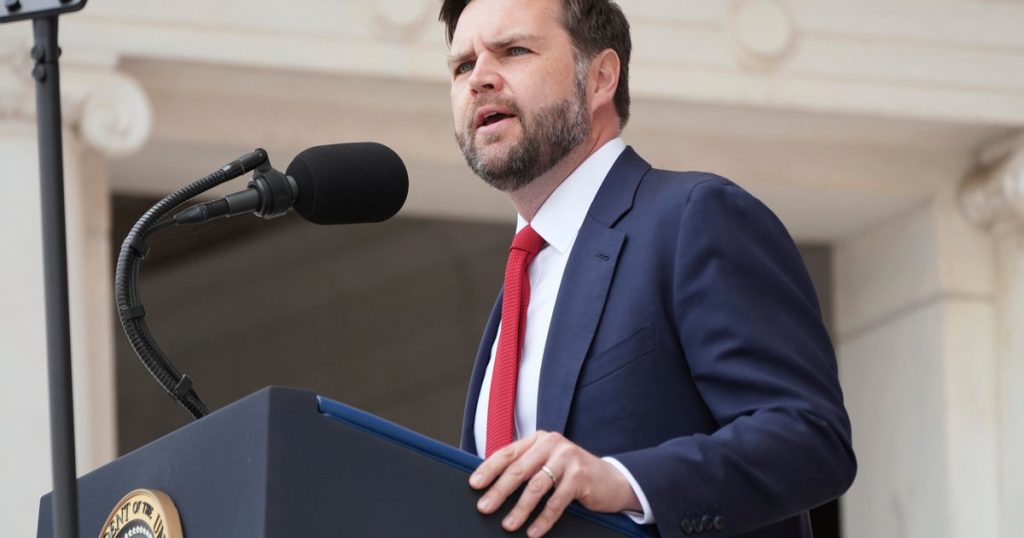In a significant move to embrace the cryptocurrency ecosystem, Vice President JD Vance is scheduled to speak at the Bitcoin 2025 Conference in Las Vegas on Wednesday. This event is part of a growing trend among Trump administration allies who are increasingly vocal in their support for digital currencies, showing a marked shift in attitude from skepticism to advocacy. The conference will also feature remarks from notable Trump family members and supporters, all of whom are engaged in the cryptocurrency space.
| Article Subheadings |
|---|
| 1) Cryptocurrency Events with Trump Allies |
| 2) The Trump Shift on Cryptocurrency |
| 3) Legal and Ethical Concerns |
| 4) Financial Implications for Trump |
| 5) Future of Cryptocurrency Regulations |
Cryptocurrency Events with Trump Allies
The Bitcoin 2025 Conference serves as a focal point for crypto enthusiasts and stakeholders, making it a pivotal event for those in the industry. Vice President Vance will join prominent figures including Donald Trump Jr. and Eric Trump, who will share insights on innovative Bitcoin business models. This gathering signifies a broader embrace of cryptocurrency within the political landscape, highlighting the increasing influence of digital currencies and their advocates. It is noteworthy that the participation of the Trump family underscores both their financial and political commitment to this emerging sector.
The Trump Shift on Cryptocurrency
Historically, Donald Trump expressed skepticism towards cryptocurrencies, labeling Bitcoin a “scam.” However, this perception has dramatically changed during his second term, with recent efforts aimed at reversing existing regulations that he views as overly restrictive. This change highlights a significant pivot not only in Trump’s personal views but also in the way the entire administration engages with digital currencies. The Trump family’s engagement in the crypto market reveals an effort to capitalize on the rapid growth of this sector, as evidenced by their investments and public appearances at cryptocurrency events.
Legal and Ethical Concerns
The growing involvement of the Trump family in cryptocurrency has spurred considerable debate regarding ethical conflicts. Critics, particularly among Democrats and ethics experts, express concerns that Mr. Trump’s investment interests could lead to conflicts of interest, potentially allowing wealthy individuals access to the president through financial contributions in the crypto arena. A bipartisan Senate bill aimed at regulating stablecoins encountered challenges, with some Democratic lawmakers leveraging Trump’s crypto investments as a rallying point against such initiatives. This environment of skepticism over ethics adds another layer of complexity to the evolving dialogue surrounding digital currencies.
Financial Implications for Trump
Reports indicate that cryptocurrency investments could constitute a significant portion of Trump’s overall financial portfolio, estimated at around $2.9 billion. Notably, the Trump Media and Technology Group, which oversees Truth Social, recently announced plans to raise $2.5 billion specifically to invest in Bitcoin. Additionally, projects such as a Trump-branded “meme coin” and various ventures aiming to capitalize on crypto trends clearly illustrate the family’s strategic pivot towards harnessing the potential of digital currencies. The repercussions of these financial maneuvers for Trump’s public image and operational legitimacy remain to be seen.
Future of Cryptocurrency Regulations
As the Trump administration re-evaluates standpoints on cryptocurrency, the regulatory landscape is poised for significant changes. The White House has consistently refuted claims of conflict-of-interest involving Trump’s cryptocurrency ventures, maintaining that his financial interests are managed by a trust administered by his children. Yet, the reluctance within legislative bodies to regulate cryptocurrencies adequately reinforces the ongoing debate about how this asset class will be governed in the future. Considering the volatile nature of cryptocurrencies and the growing appetite for them among the populace, the outcome of these discussions will have far-reaching implications for the industry.
| No. | Key Points |
|---|---|
| 1 | Vice President JD Vance will address the Bitcoin 2025 Conference, showcasing political support for cryptocurrency. |
| 2 | Donald Trump and his family have shifted their views towards advocating for cryptocurrencies, contrasting earlier skepticism. |
| 3 | Concerns about conflicts of interest are rising due to Trump’s financial ties to the cryptocurrency market. |
| 4 | Crypto investments potentially make up a significant portion of Trump’s net worth, estimated at $2.9 billion. |
| 5 | The regulatory landscape for cryptocurrencies is evolving, influenced by the Trump administration’s changing stance. |
Summary
The Bitcoin 2025 Conference represents a pivotal moment in the intersection of politics and cryptocurrency, highlighting the evolving attitudes of the Trump administration towards digital assets. With Vice President JD Vance’s participation and continuing support from Trump family members, the landscape of cryptocurrency in the United States is rapidly transforming, raising pertinent questions about regulatory frameworks and potential conflicts of interest.
Frequently Asked Questions
Question: What are the main themes at the Bitcoin 2025 Conference?
The Bitcoin 2025 Conference focuses on the latest trends in cryptocurrency, featuring discussions on innovative business models and the evolving political landscape surrounding digital currencies.
Question: Why has Trump’s stance on cryptocurrency changed?
Trump’s evolving perspective likely stems from the growing popularity and financial opportunities associated with cryptocurrencies, along with pressure to adapt to the changing economic environment.
Question: What risks are associated with Trump’s financial interests in cryptocurrency?
There are significant ethical concerns regarding conflicts of interest, as Trump’s financial ties to the cryptocurrency sector could influence political decisions and regulatory policies.
